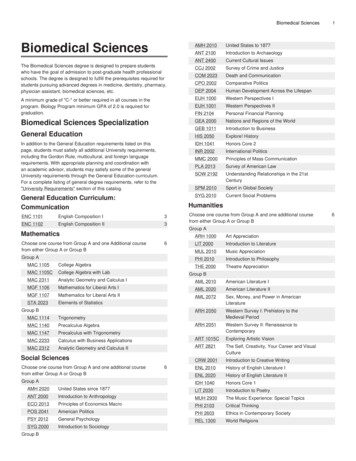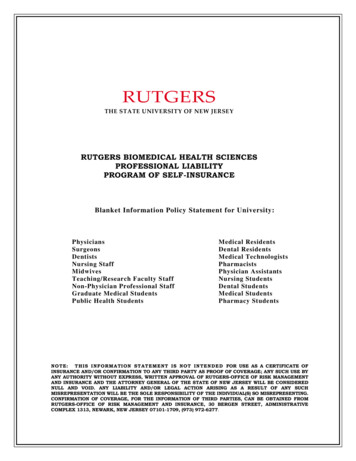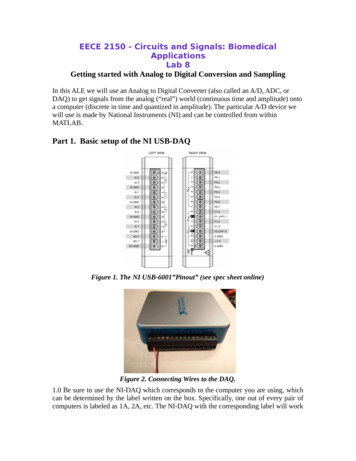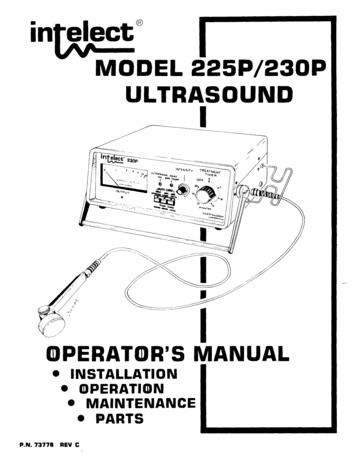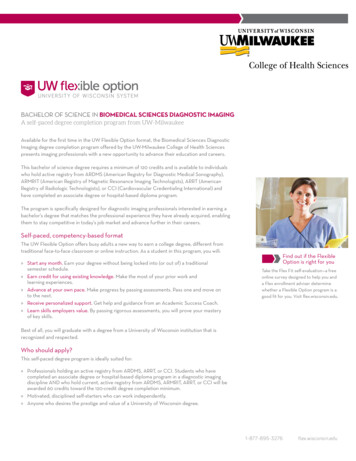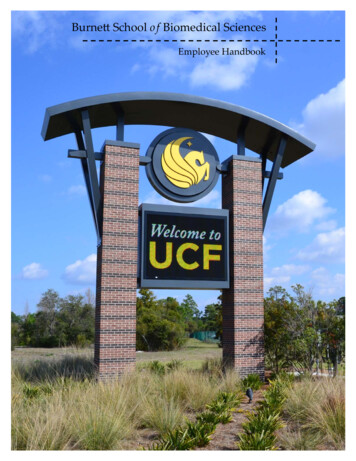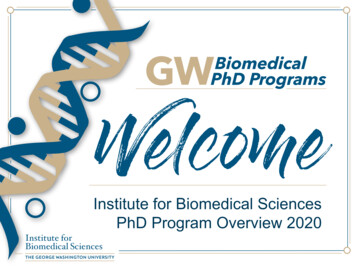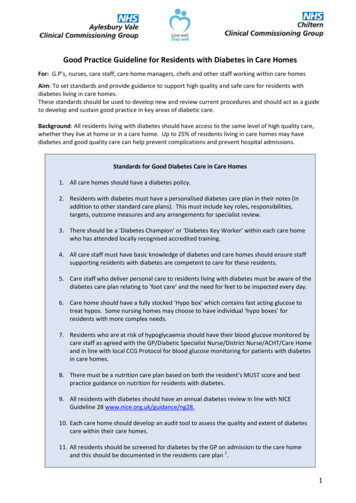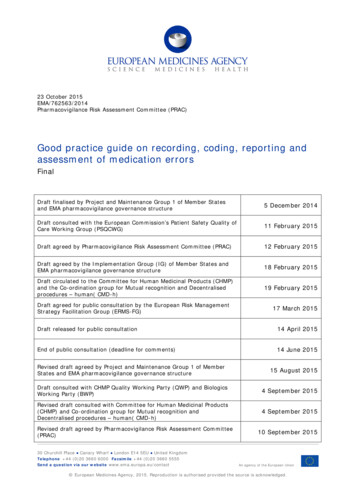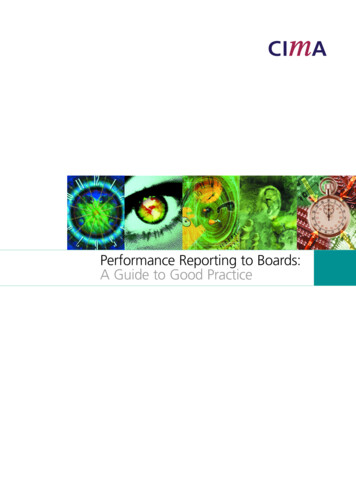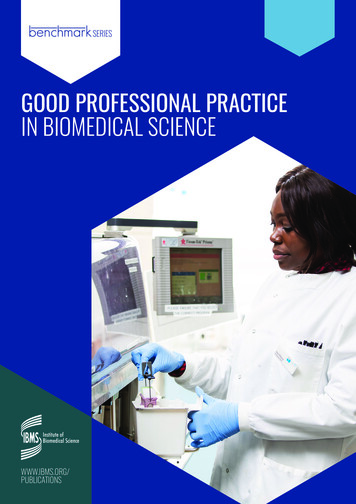
Transcription
GOOD PROFESSIONAL PRACTICEIN BIOMEDICAL SCIENCEWWW.IBMS.ORG/PUBLICATIONS
GOOD PROFESSIONAL PRACTICE IN BIOMEDICAL SCIENCEGOOD PROFESSIONAL PRACTICEABOUT THIS DOCUMENTThe Institute of Biomedical Science (IBMS) is a standard settingorganisation and the professional body for biomedical scienceprofessionals; it sets standards of professional practice and behaviourthrough its qualifications, Code of Conduct, guidance and policystatementsGood Professional Practice is a professional best standards policydocument produced by the IBMS, whose members include scientistsworking at all levels in biomedical science, some of whom may beregulated as biomedical scientists through the Health and CareProfessions Council (HCPC) or registered with the Science Council asRegistered Technicians (RSciTech), Registered Scientists (RSci) orChartered Scientists (CSci).This document has been developed to help those who work in biomedicalscience to reassure their employers, professional colleagues, serviceusers and the wider general public that any decisions made will bewell-informed, reasoned and justifiable. Good Professional Practicealso defines a foundation of principles for effective, competent andsafe practice that hold true for any changes in science, technology andservice delivery.In this document the generic term “biomedical science professional” isused to describe the full breadth of individuals working within the fieldof biomedical science, including those who are in IBMS membership.The term “biomedical scientist” is a protected title and refers only tothose registered with the HCPC.WHY WE NEED GOODPROFESSIONAL PRACTICEThose who work in biomedical science require and expect expertguidance from their professional body to provide leadership and to helpensure safe and effective practice. This Institute standard is consistentwith comparable statutory or regulatory standards and providesguidance for individuals whose practice is non-regulated.WHAT THIS POLICY DOESThis document states the standards of professional competence andconduct expected of biomedical science professionals in all aspects oftheir professional practice. It is intended to support and complementthe Institute’s Code of Conduct for members and serves as a benchmarkof professional practice in biomedical science. It provides professionalrecommendations and guidance on standards of conduct, competenceand professional standards for biomedical science professionals ofall grades and in all areas of professional practice. The standards andrecommendations contained herein are the informed opinion of theprofessional body in respect of best practice and as such are applicableto both members and non-members.WHAT THIS POLICY DOES NOTThis policy does not attempt to be fully prescriptive or restrictive;unless referring to an Act of Parliament or statutory obligation therecommendations are not legally enforceable, although the deliberatedisregard of professional best practice recommendations could be citedas part of a disciplinary case.Good Professional Practice is the IBMS’ lead policy statementon best practice in biomedical science; for policy and guidanceon specific issues please refer to the relevant IBMS BenchmarkPolicies.2IBMS
GOOD PROFESSIONAL PRACTICE IN BIOMEDICAL SCIENCE1. STANDARDS OF PROFESSIONALPRACTICE1.1 RESPONSIBILITY B iomedical science professionals are expected to act and behavein a professional manner at all times, mindful that their actionsand conduct represent the standards by which they and theprofession are judged. A s members of a profession individuals are responsible for theiractions, their omissions and their behaviours and need to beable to justify any decisions taken within their scope of practice.Individuals should recognise any deficiencies they may have andtake appropriate action to rectify them. Patient safety and a delivery of high-quality care is theexpectation of all biomedical science professionals. Biomedicalscientists and other biomedical science professionals areaccountable to their professional organisation, the laws andrequirements of their practice, their registration authority and thepatients they serve. B iomedical science professionals must exercise their professionalduty of care and work within the legal, ethical and regulatoryframeworks that govern and affect practice. Those whose roleinvolves a high degree of autonomy (e.g. biomedical scientists) arerequired to exercise their professional judgement. Notwithstanding the requirements of statutory regulationsfor professional practice*, all those working and practising inbiomedical science should do so first and foremost according tothe standards of practice set by their employer, organisation orspecialty.* For those providing a service for the National Health Servicethe HCPC is the regulatory body responsible for setting andmaintaining standards of professional training, performance andconduct of the healthcare professionals that it regulates, includingthose practising under the protected title of ‘biomedical scientist’. T he United Kingdom Accreditation Service (UKAS) externallyaudits and accredits public and private pathology laboratoriesagainst defined standards of practice. The Institute stronglyrecommends that all laboratories should be accredited in order toprovide and ensure a high-quality, safe service.1.2 RESEARCH Ethical clearance must be obtained from an appropriate localethics committee or similar local body for research workundertaken. If there is any doubt as to whether ethical clearance isrequired, an assessment of risk should be carried out and if thereis any remaining doubt reference should be made, in advance, tothe local ethics committee or body. The obtaining of data and its presentation/publication must beunbiased and responsible. Validity, objectivity and reliabilityare key principles and caution should be exercised with theinterpretation and explanation of test results. Biomedical science researchers should seek to maximise theaccessibility of research findings and, wherever appropriate,publish them in the interest of biomedical science.1.3 DATA PROTECTION Storage and use of individually identifiable data must be inaccordance with the provisions of the Data Protection Act 1998.(General Data Protection Regulation (GDPR) will apply from 25May 2018). Publication of data must not disclose the identity of, or means toidentify, any individual patient or staff member unless the priorwritten consent of the individual is obtained.IBMS3
GOOD PROFESSIONAL PRACTICE IN BIOMEDICAL SCIENCE2. PROFESSIONAL COMPETENCE2. PROFESSIONAL COMPETENCE2.1 REGULATION AND REGISTRATION2.2 CONTINUING PROFESSIONAL DEVELOPMENT (CPD)AND REFLECTIVE PRACTICE Registration, whether through statute (i.e. through the HCPC) orvoluntary (e.g. Science Council Registered Scientist or RegisteredScience Technician) indicates that a professional standard hasbeen achieved. Those individuals that are not registered oneither a statutory or voluntary register still have a professionalduty of care to achieve and maintain a standard of professionalcompetence commensurate with their scope of practice. T hose who work in biomedical science must abide by the legaland statutory requirements regulating the profession. For HCPCregistered individuals failure to do so could result in them beingsuspended or removed from the HCPC’s register. A s HCPC standards are based on statutory and legal requirementsthey take precedence in any professional conflict of interest. TheIBMS supports all HCPC standards and expects all biomedicalscientists to be aware of and practice to the standardsaccordingly. I nstitute members should note that failure to adhere to legalrequirements of practice and recommended principles ofprofessional good practice could affect an individual’s cover underthe Institute’s medical malpractice insurance scheme, and mayresult in expulsion from the Institute’s membership B iomedical science professionals that are registered with theScience Council (RSciTech, RSci, CSci), or who have statutoryregulation as a biomedical scientist, must continuously developand demonstrate their knowledge and skills to reflect professionaland scientific advances and guide best professional practice. Theyare expected to do this through reflection and self-managementprocesses such as continuing professional development. K nowing one’s limit of practice is essential and biomedical scienceprofessionals are always encouraged to seek advice from, andoffer support to, fellow professionals and colleagues. The IBMS isalways available for professional advice, as part of its function asa professional body. CPD is a process of lifelong learning, which enables biomedicalscience professionals to expand and fulfil their personal andprofessional potential, as well as meet the present and future needsof patients and deliver health outcomes and priorities. It assures thatbiomedical science professionals meet the requisite knowledge andskills levels that relate to their evolving scope of professional practice.The IBMS offers a CPD scheme that covers a wide range of activitiesto help and encourage its members to maintain, improve and extendtheir knowledge and skills through a process of reflective practice. The HCPC and the Science Council have set standards forcontinuing professional development and all registrants have aprofessional responsibility to adhere to these standards for CPD inorder to remain on the HCPC register (to practise as a biomedicalscientist) or on the Science Council registers as a CharteredScientist, Registered Scientist or Registered Science Technician. All members of the IBMS are automatically enrolled on theInstitute’s CPD scheme as a direct benefit of membership and tosupport the responsibility of regulated and registered members oftheir responsibility to undertake CPD as an integral part of theirprofessional practice.2.3 SUPERVISION AND TRAINING A ll those who work in biomedical science should engage in thetraining and mentoring of other staff as required, not just to helpwith career development, but also to ensure skills, standards ofpractice and values are maintained and disseminated throughoutthe profession. B iomedical science professionals involved in any such activitiesmust demonstrate the skills, attitudes and practices of a caringand competent teacher/trainer. They should be objective andhonest when supervising, appraising, mentoring, evaluating orassessing the performance of others and be aware that serviceusers will be at risk if someone is described as competent who hasnot yet met or maintained a satisfactory standard of practice. L aboratories are required by accreditation services to have namedtraining officers/managers and a written training policy to directstaff training and development. The Institute recommends that alltraining managers should have an appropriate qualification suchas the Institute’s Certificate of Expert Practice in Training. TheInstitute’s Guidance on the Management of Training and the Role of thePathology Training Manager provides further information on the duties,responsibilities and authority of a training manager/co-ordinator.4IBMS
GOOD PROFESSIONAL PRACTICE IN BIOMEDICAL SCIENCE2. PROFESSIONAL COMPETENCE2. PROFESSIONAL COMPETENCE2.4 RETURNING TO PRACTICE2.5 MANAGEMENT AND LEADERSHIP B iomedical science professionals returning to practice have aresponsibility to undertake a period of re-familiarisation and, ifnecessary, retraining. Those responsible for the supervision orretraining of staff have a responsibility to ensure an appropriate periodof re-familiarisation and training is undertaken and competenceassessed and documented prior to full resumption of duties. The HCPC has published a guidance document Returning toPractice for regulated health professionals who have taken a breakfrom practising, and who wish to start practising again. The IBMSmakes the additional recommendation: I ndividuals wishing to return to practice in a clinical laboratoryshould use the Institute portfolios as a framework for updatingtheir knowledge and skills, for example, the Specialist Portfolio indiscipline specific areas. A self-assessment of knowledge and skills achieved prior to abreak in practice should be conducted against the portfolio toidentify training needs (Gap Analysis) T raining should be carried out in an Institute approved traininglaboratory and in accordance with these IBMS Good ProfessionalPractice guidelines. T he period of updating should be signed off by a registered biomedicalscientist as a record of the areas of the specialist portfolio completedand whether competence to practice was achieved. Biomedical science professionals are encouraged, and havea professional responsibility, to offer advice and expertise toindividuals, teams, committees or working groups where theirinput can contribute positively to a service or project outcome Managers should ensure that the good professional practice ofindividuals, teams and the service are balanced with the needs ofthe employer and the users of the service. Managers will ensure that all staff are appropriately recruited,trained, qualified, supervised and competent to practice. They willalso seek to ensure that the performance and quality of laboratoryservices reaches the highest possible standards by implementingpolicies and protocols, training and quality management systems. Managers will ensure clear communication, systems for raisingconcerns, opportunities for staff engagement, transparency, goodgovernance, a secure working environment, support and careerdevelopment for all staff. Managers must make themselves familiar with the laws andregulations relevant to their workplace and working practices andkeep up to date with best practice. The Institute recommends that all managers should have anappropriate management qualification such as the Institute’sHigher Specialist Diploma in Management and Leadership or theCertificate of Expert Practice in Management and leadership. The Institute recommends that all quality managers should havean appropriate qualification such as the Institute’s Certificateof Expert Practice in Quality Management. The Institute’sGuidance on Quality Management in Laboratories provides furtherinformation on the duties, responsibilities and authority of aquality manager.IBMS5
GOOD PROFESSIONAL PRACTICE IN BIOMEDICAL SCIENCE3. PROFESSIONAL BEHAVIOUR3. PROFESSIONAL BEHAVIOUR3.1 CONDUCT3.3 RAISING CONCERNS Biomedical science professionals must adhere to appropriatestandards of personal as well as professional conduct and mustnot act in a dishonest, indecent, violent or inappropriate mannerthat could bring the profession into disrepute, irrespectiveof whether such behaviour is directly connected with theirprofessional practice or not. Raising concerns or whistleblowing about the poor performanceof healthcare professionals or a laboratory service, or being askedto practice in a way that could compromise patient safety, can beone of the most delicate and difficult things to do as it can involvefriends and work colleagues and therefore must be done in goodfaith and for clear reason. Use of alcohol or medication must not adversely affectprofessional performance or bring the profession into disrepute Patients’ and other service users’ safety is paramount and mustoverride personal and professional loyalties. All biomedical scienceprofessionals have an obligation to uphold the reputation of theprofession; this extends to taking action to protect patientswhen there is reason to believe that another individual’s conduct,performance or health is putting patients at risk. Biomedical science professionals must not make statementsor announcements in connection with their practice (or induceothers to do so) that are untrue, misleading or unethical and mustnot carry out any other act or omission in connection with theirpractice that is liable to mislead the public or other professionals. False claims regarding qualifications or membership oforganisations to which an individual does not belong must notbe made. Biomedical science professionals must not use titlesprotected by statute referring to particular specialisms, whichthey are not qualified or eligible to use.3.2 PARTNERSHIPS AND COOPERATION Biomedical science professionals operate in many diverse rolesas members of a team providing multi-disciplinary and multiprofessional healthcare across different care pathways. They mustbe able to consult and work in partnership with other professionalsin the interests of patients and users of their services Good communication skills are vital for relaying clear and conciseinformation, advice, instruction and professional opinion tocolleagues and service users to inform decisions on the care of apatient. Those who practice biomedical science should be aware of theiremployer’s mission statement, objectives and standards. Theyshould be clear about the personal contribution expected of themin support of these aims. In return the employer should provideall staff with clear roles, responsibilities, training, communicationmechanisms and accessible operating procedures.6 All biomedical science professionals regulated by statute, as partof their duty of care to the public, have the legal obligation andmoral responsibility to raise concerns without delay if individual orservice performance could compromise patient safety. There maybe circumstances where not raising concerns could be breakingnational laws as well as breaching the terms of HCPC registration. Where biomedical science professionals work as part of a widerprofessional team, they must work in a collaborative and cooperative manner with other members of the team with a view toachieving the best possible service or outcomes. If those who practice biomedical science are in a situation wherethey need to raise concerns they must do so via local proceduresbut may also contact the IBMS for advice and support. The key role of diagnostics services in healthcare means thatthose who practice biomedical science need to be involved at alllevels of the organisation as leadership and management will helpdeliver service or influence change to improve patient care. Partof the professional role of biomedical scientists is to work withhealthcare science colleagues or groups to enhance networking,workforce planning and clinical engagement.IBMS
GOOD PROFESSIONAL PRACTICE IN BIOMEDICAL SCIENCEIBMS AND DEVELOPINGSTANDARDS OF PRACTICEHELP AND SUPPORT FOR GOODPROFESSIONAL PRACTICEThe Institute through its Council, its advisory panels and its networkof representatives is fully involved in the development of many of theexternal standards and guidance referenced in this document. TheInstitute’s involvement in developing standards includes representationon external committees and working groups, expert responses toconsultations and partnership with other bodies and organisations.Good Professional Practice reflects and outlines standards and practicethat in the modern professional and scientific environment are constantlyevolving. One set of guidance or standards cannot fully embrace thediversity and complexity of biomedical science and these should be usedin conjunction with other organisational, regulatory and professionalstandards. Individuals working in biomedical science are thereforeencouraged to communicate with the Institute with suggestions andfeedback on Good Professional Practice to further develop and enhanceprofessional guidance for the benefit of colleagues and the profession.In addition, a professional qualification framework supports lifelonglearning to enhance scope of practice throughout a career pathway.The role of the IBMS is to support
the Institute’s medical malpractice insurance scheme, and may . RSci, CSci), or who have statutory regulation as a biomedical scientist, must continuously develop and demonstrate their knowledge and skills to reflect professional and scientific advances and guide best professional practice. They . (
